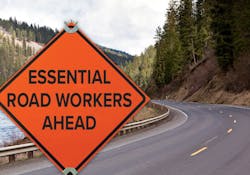While the ongoing COVID-19 pandemic has fundamentally changed many industries and aspects of day-to-day life in the U.S., roadway work has continued to press on despite the challenges. With road projects deemed essential early on, state departments of transportation (DOTs) and contractors were able to keep them on track, if not ahead of schedule in some cases.
For Time Striping, a highway construction company in Arkansas, the pandemic hasn’t caused a huge impact aside from the safety precautions taken to socially distance and wear masks.
“We're obviously very proud to have been deemed essential and really try to push that with our employees so that they understand how lucky we are that we get to press on and keep working,” says Cindy Williams, president of Time Striping. “We really haven't seen a slowdown in our production at all.”
At the California Department of Transportation (Caltrans), chief construction engineer Rachel Falsetti says projects have stayed on schedule over the past several months. While traffic today has now bumped up closer to normal levels, Caltrans was able to take advantage of the reduced traffic in the spring to extend lane closure hours on some sites. One bridge project on U.S. 101 in the Bay Area—originally scheduled to cause massive delays during the summer—was able to shift up to the spring with minimal impact to the traveling public.
While roadway work has been able to move forward with little disruption, COVID-19 brought additional challenges to the industry as essential in-person training sessions came to a halt. Donna Clark, vice president of Member Services at the American Traffic Safety Services Association (ATSSA), says the organization quickly recognized the need for virtual programming and expanded its capabilities.
“Fortunately, ATSSA already had a few online courses and certifications in place, so we could quickly pivot and deliver some of our most popular and most critical courses to keep workers trained for their essential duties,” she says. “Within two weeks, we had a virtual format for our Traffic Control Technician (TCT) and Traffic Control Supervisor (TCS) course.”
ATSSA then worked on getting state DOTs on board with the virtual training format, with 28 states and counting currently accepting the programs. For Caltrans, the process was a no-brainer, given the department’s recognition of ATSSA and the growing focus on virtual opportunities even pre-COVID. Falsetti says offering training is a top priority when it comes to keeping workers safe.
“Safety is utmost, and we want to make sure everyone gets home safely, so ensuring our workforce is trained is incredibly important and something that the contractors along with Caltrans very much emphasize,” Falsetti says.
As a member of ATSSA, Williams says Time Striping has benefitted from the online training program. When COVID hit, the contractor had already registered some of its workforce for some needed certifications that would no longer be available in person. Once ATSSA brought these trainings online and the Arkansas Department of Transportation approved them, Time Striping was able to move forward with virtual training.
“We were able to go ahead and get those gentlemen through the class and get their certifications handled, so that we've got fully trained individuals working out on the road,” Williams says. “Just because the virus hit and just because there's stay-at-home orders doesn't mean that our work stops, and if our work doesn't stop, we have to be trained to do the work. So that was a huge benefit that they provided for us.”
With a new normal setting in for at least the near future, state DOTs and contractors will continue to adapt and move forward with projects that benefit the economy and keep roadways safe.
“It's going to be a little bit of a shift, but I'm just thankful the industry has been able to step up and keep these contracts moving forward and keep the economy going, because I think it's critical to all of us,” Falsetti says.
For more information regarding ATSSA virtual training visit ATSSA.com/VirtualTraining.



